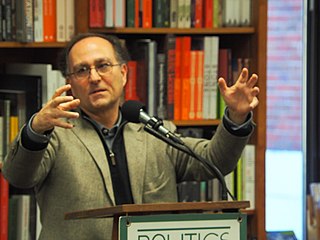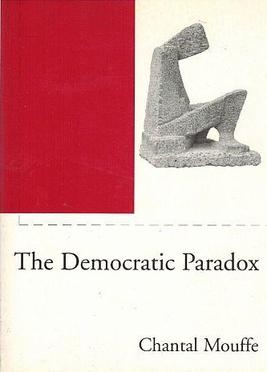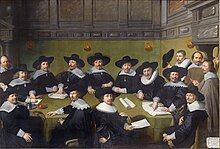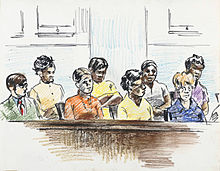Deliberative democracy or discursive democracy is a form of democracy in which deliberation is central to decision-making. Deliberative democracy seeks quality over quantity by limiting decision-makers to a smaller but more representative sample of the population that is given the time and resources to focus on one issue.
Participatory democracy, participant democracy, participative democracy, or semi-direct democracy is a form of government in which citizens participate individually and directly in political decisions and policies that affect their lives, rather than through elected representatives. Elements of direct and representative democracy are combined in this model.

Applied philosophy is a branch of philosophy that studies philosophical problems of practical concern. The topic covers a broad spectrum of issues in environment, medicine, science, engineering, policy, law, politics, economics and education. The term was popularised in 1982 by the founding of the Society for Applied Philosophy by Brenda Almond, and its subsequent journal publication Journal of Applied Philosophy edited by Elizabeth Brake. Methods of applied philosophy are similar to other philosophical methods including questioning, dialectic, critical discussion, rational argument, systematic presentation, thought experiments and logical argumentation.

Ernesto Laclau was an Argentine political theorist and philosopher. He is often described as an 'inventor' of post-Marxist political theory. He is well known for his collaborations with his long-term partner, Chantal Mouffe.

Chantal Mouffe is a Belgian political theorist, formerly teaching at University of Westminster.
Agonism is a political and social theory that emphasizes the potentially positive aspects of certain forms of conflict. It accepts a permanent place for such conflict in the political sphere, but seeks to show how individuals might accept and channel this conflict positively. Agonists are especially concerned with debates about democracy, and the role that conflict plays in different conceptions of it. The agonistic tradition to democracy is often referred to as agonistic pluralism. A related political concept is that of countervailing power. Beyond the realm of the political, agonistic frameworks have similarly been utilized in broader cultural critiques of hegemony and domination, as well as in literary and science fiction.

Hegemony and Socialist Strategy: Towards a Radical Democratic Politics is a 1985 work of political theory in the post-Marxist tradition by Ernesto Laclau and Chantal Mouffe. Developing several sharp divergences from the tenets of canonical Marxist thought, the authors begin by tracing historically varied discursive constitutions of class, political identity, and social self-understanding, and then tie these to the contemporary importance of hegemony as a destabilized analytic which avoids the traps of various procedures Mouffe and Laclau feel constitute a foundational flaw in Marxist thought: essentializations of class identity, the use of a priori interpretative paradigms with respect to history and contextualization, the privileging of the base/superstructure binary above other explicative models.

Public consultation, public comment, or simply consultation, is a process by which members of the public are asked for input on public issues. This can occur in public meetings open to all in written form, as well as in deliberative groups. Surveys and deliberative groups can be conducted with self-selected citizens or with statistically representative samples of the population which enables the identification of majority opinion. Its main goals are to improve public involvement and influence, as well as the transparency and efficiency of government projects, laws, or regulations.
Radical democracy is a type of democracy that advocates the radical extension of equality and liberty. Radical democracy is concerned with a radical extension of equality and freedom, following the idea that democracy is an unfinished, inclusive, continuous and reflexive process.
Mediated deliberation is a form of deliberation that is achieved through the media which acts as a mediator between the mass public and elected officials. The communication professionals of the media relay information, values, and diverse points of view to the public in order for effective public deliberation to occur. Benjamin Page proposes mediated deliberation be a "division of labor" with the idea of using the media to deliver information between the elected officials and the public because modern problems make it impossible to rely on the elected officials to deliberate for the public. The role of the media is to encourage discussion amongst the citizens to keep them engaged with their elected officials.
In governance, sortition is the selection of public officials or jurors using a random representative sample.

Robert B. Talisse is an American philosopher and political theorist. He is currently Professor of Philosophy and Chair of the Philosophy Department at Vanderbilt University in Nashville, Tennessee, where he is also a Professor of Political Science. Talisse is a former editor of the academic journal Public Affairs Quarterly, and a regular contributor to the blog 3 Quarks Daily, where he posts a monthly column with his frequent co-author and fellow Vanderbilt philosopher Scott Aikin. He earned his PhD in Philosophy from the Graduate Center of the City University of New York in 2001. His principal area of research is political philosophy, with an emphasis on democratic theory and liberalism.
Post-politics refers to the critique of the emergence, in the post-Cold War period, of a politics of consensus on a global scale: the dissolution of the Eastern Communist bloc following the collapse of the Berlin Wall instituted a promise for post-ideological consensus. The political development in post-communist countries went two different directions depending on the approach each of them take on dealing with the communist party members. Active decommunisation process took place in Eastern European states which later joined EU. While in Russia and majority of former USSR republics communists became one of many political parties on equal grounds.
A citizens' assembly is a group of people selected by lottery from the general population to deliberate on important public questions so as to exert an influence. Other names and variations include citizens' jury, citizens' panel, people's panel, mini-publics,people's jury, policy jury, consensus conference and citizens' convention.
The Essex School of discourse analysis, or simply 'The Essex School', refers to a type of scholarship founded on the works of Ernesto Laclau and Chantal Mouffe. It focuses predominantly on the political discourses of late modernity utilising discourse analysis, as well as post-structuralist and psychoanalytic theory, such as may be found in the works of Lacan, Foucault, Barthes, and Derrida. Discourse analysis, according to its own terms at least, seeks to "unfix and destabilise" the accepted meanings of everyday language, and to reveal how the dominant discourse "marginalises and oppresses... equally valid claims to the question of how power could and should be exercised."

The Democratic Paradox is a collection of essays by the Belgian political theorist Chantal Mouffe, published in 2000 by Verso Books. The essays offer further discussion of the concept of radical democracy that Mouffe explored in Hegemony and Socialist Strategy, co-authored by Ernesto Laclau. In this collection, Mouffe deals with the specific conflicts between the post-Marxist democratic theory that she and Laclau theorized in Hegemony and Socialist Strategy and the competing democratic theories proposed by Jürgen Habermas and John Rawls. Verso's UK blog characterizes The Democratic Paradox as Mouffe's most accessible review of her perspectives on radical democracy.
YourView is an Australian not-for-profit debate website, founded in 2012.
Online deliberation is a broad term used to describe many forms of non-institutional, institutional and experimental online discussions. The term also describes the emerging field of practice and research related to the design, implementation and study of deliberative processes that rely on the use of electronic information and communications technologies (ICT).
Epistemic democracy refers to a range of views in political science and philosophy which see the value of democracy as based, at least in part, on its ability to make good or correct decisions. Epistemic democrats believe that the legitimacy or justification of democratic government should not be exclusively based on the intrinsic value of its procedures and how they embody or express values such as fairness, equality, or freedom. Instead, they claim that a political system based on political equality can be expected to make good political decisions, and possibly decisions better than any alternative form of government .
A deliberative referendum is a referendum that increases public deliberation through purposeful institutional design.:557 The term "deliberative referendum" stems from deliberative democracy,:509 which emphasises that "the legitimacy of decisions can be increased if...decisions are preceded by authentic deliberation.":903 Deliberative design features can promote public deliberation prior to and during the referendum vote to increase its actual and perceived legitimacy.:910 Deliberative referendums encourage open-minded and informed reasoning, rather than rigid "pre-formed opinions".:508-512 "[A]fter deliberations, citizens routinely alter their preferences".:910









